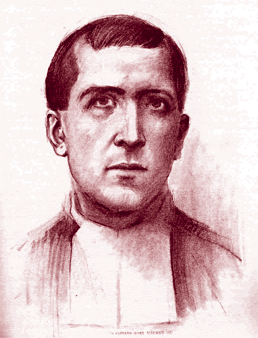“God be blessed; I'll pray
for all of you in heaven. What more could I desire than to die for no other
crime but that of being a religious and for having made my contribution to the
Christian education of children. Dear father and family, I have been judged
and condemned to death. I accept the sentence with joy. No charges have been
brought against me. I have been condemned to death only because I am a
religious. Do not weep for me, I am not worthy of pity. I shall die for God and
for my country. Farewell, I shall be waiting for you in heaven.” (Saint Jaime Hilario Barbel, writing to his
family upon learning his death sentence, prior to his martyrdom)
Today, January 18, we
celebrate the feast day of Saint Jaime Hilario Barbel (1898-1937), educator and
courageous martyr for the faith. On the
occasion of his canonization, Blessed Pope John Paul II proclaimed, “The ninth
Brother, Brother Jaime Hilario Barbel, was from Catalonia and was martyred in
1937 near Tarragona. The Passionist Father had come to the school in Turon in
order to hear the children's confessions. The Church is glorifying… [him]
because they remained faithful to their consecration even as far as giving
their life for the faith and their evangelizing mission. The official
recognition of their holiness exalts at the same time their mission - one that
we know is delicate and difficult - as Christian educators of youth.”
Manuel Barbal Cosan was born in Enviny, a town nestled at the
foot of the Pyrenees Mountains in northern Spain. Devout and serious from a young age, his parents were all too
pleased to give their blessing when he verbalized his desire to enter the minor
seminary at Urgel. He was only 12!
Sadly, Manuel soon
developed hearing problems, which led to the gradual loss of hearing in his
ears over the course of his life. He
was advised to leave the seminary, and returned home. There, he continued his daily prayers and devotions, and looked
for alternative ways in which to serve the Lord. Convinced that he was called to enter the religious life, Manuel
was overjoyed to be accepted into the Institute of the Brothers of the
Christian Schools in 1917. Traveling to
Irun, Spain, he entered the novitiate and took the name Jaime Hilario. Brother Jaime spent the next 16 years in
various teaching assignments, working with children, and spreading the Word of
God. Working as a catechist and
educator, Jaime strongly believed in universal education, especially for the poor
and marginalized. After that time, his
hearing loss became too profound to continue as an educator, and instead, he
tended the garden at the house of formation in San Jose, Tarragona. This work he undertook with his usual zeal
and effort, finding God in the smallest and most menial of tasks.
In 1936, on a trip to
visit his family at Enviny, the Spanish Civil War began. During the war, religious were actively
arrested and persecuted. Jaime was
immediately recognized as a Brother, arrested, and imprisoned. In December, he was moved to Tarragona, and
confined in a prison ship with several other brothers. There, he did the best he could to keep
their spirits up and inspire the group not to lose faith. Tried in 1937, and offered freedom if he
denounced his order and claimed to be only a gardener, Brother Jaime refused,
insisting on his identity as a servant of God and brother of the order.
 He was sentenced to
execution and brought to the cemetery where it was to occur, known as the Mount
of Olives. On January 18, as he faced
down the firing squad, Saint Jaime proclaimed, “To die for Christ, my young
friends, is to live.” The first two
volleys of the firing squad failed to wound him, and the soldiers responsible
dropped their rifles and fled in panic.
It is said that they purposefully missed, as they feared to harm such a
holy and courageous man. Their
commander, however, was not moved, and fired five shots at close range, killing
Saint Jaime instantly. Following his
death, over the course of the war, 96 LaSalle Brothers were killed in
Catalunia, Spain. Saint Jaime is the
first to be recognized as saint and martyr.
He was sentenced to
execution and brought to the cemetery where it was to occur, known as the Mount
of Olives. On January 18, as he faced
down the firing squad, Saint Jaime proclaimed, “To die for Christ, my young
friends, is to live.” The first two
volleys of the firing squad failed to wound him, and the soldiers responsible
dropped their rifles and fled in panic.
It is said that they purposefully missed, as they feared to harm such a
holy and courageous man. Their
commander, however, was not moved, and fired five shots at close range, killing
Saint Jaime instantly. Following his
death, over the course of the war, 96 LaSalle Brothers were killed in
Catalunia, Spain. Saint Jaime is the
first to be recognized as saint and martyr.
Saint Jaime’s words
inspire us today, to listen for, and follow the Lord’s commands, and to
dedicate ourselves to him: “The day you learn to surrender yourself totally to
God, you will discover a new world, just as I am experiencing. You will enjoy a
peace and a calm unknown, surpassing even the happiest days of your life.”











0 comments:
Post a Comment
Thanks for leaving a comment. If you wish to submit a prayer request, however, please do so above, using the "Contact" tab.